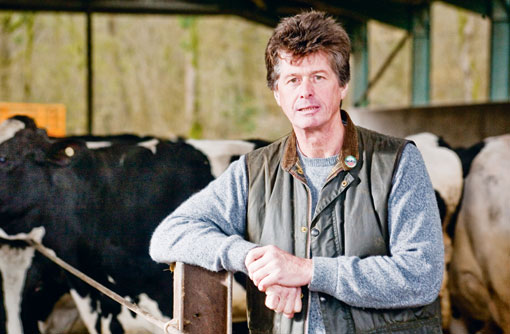Safe use of medicines campaign: Dairy farmer’s view

Tighter regulation on medicine use is a hot topic, but are the proposals being put forward the right ones? Gwyn Jones, dairy producer and chairman of the European Platform for the Responsible Use of Medicines in Animals, gives his thoughts
Good husbandry, proper infrastructure and healthy animals are the key to low bacterial infection and minimising the need to treat animals with antibiotics in the first instance.
It is vital farmers have the means to invest in skilled labour, training, infrastructure and expertise on housing, ventilation and, of course, the vet’s skills. The supply chain has a shared responsibility to make sure the returns on farm allow this to take place.
In the UK we have made great efforts within the NFU and the BVA to persuade and enable farm vets to charge properly for their expertise and skills, and not rely on the sale of medicines for their income. A financially viable farm business needs a financially viable vet working alongside, and it is vital to get this relationship right.
I therefore strongly disagree with the notion that farm vets should be decoupled from selling antibiotics. This is not the solution or a proportionate response to the resistance issue. The consequence of decoupling could lead to reduced healthcare for animals, especially those in outlying areas and a long way from supply.
“There is no doubt antibiotics use on farm will change in the future”
Gwyn Jones
The EU Commission has indicated it has concerns with “highway vets”, a particular issue in some European countries where there is evidence of irresponsible selling of vet medicines. The UK’s position is there are legislative solutions in place to deal with this, and proper enforcement of the law would resolve the issue.
The internet is a very difficult area to control, and I would argue while it remains outside the control of regulators, it is futile and penal to push regulation on farm and in the veterinary practice further.
A European solution is also difficult as there are different structures and practices across the EU and, let’s be honest, the conditions in Scandinavia with low animal density, long cold winters and nothing but sea all around, is very different to those of the Mediterranean countries, with high temperatures in the summer and nearby Asia and Africa presenting a big challenge.
Again the UK is trying to react responsibly around internet trading; the Veterinary Medicines Directorate (VMD) introduced a voluntary accreditation scheme for internet sites, which the NFU had asked for, and which we encourage our members to use. This could be supported and copied by the rest of Europe, giving the Commission a possible solution for other member states.
Reducing antibiotics use on farm by targeting reductions as we have seen in some countries is also, to my mind, the wrong approach. What we need is responsible use, where the animal in question receives the right amount of the right medicine at the right time. We need to be very careful in our use of third- and fourth-generation cephalosporin and fluroquinolones, administering only when clinical history and lab analysis show the need. We must not allow demanding farmers or overzealous vets to compromise our position in this area. It is important these antibiotics are available for use in agriculture, but we all have a duty to do so responsibly.
There is no doubt antibiotics use on farm will change in the future, and some changes could be linked to good management decisions. For example, we need to consider if every cow needs antibiotic dry-cow therapy, or if it should be based on lactation history. Some farmers are doing this; others worry about the consequences of getting it wrong, which could be serious. On the other hand, the work of Prof Laura Green from Warwick University on foot-rot in sheep highlights clearly that an antibiotics injection is the right way to treat this painful and costly disease.
A balance must be struck between the need for the right treatment at the right time and an insurance-policy approach; relying on antibiotics to prop up any husbandry system is unsustainable.
There will be great demands on agriculture over the next 40 years as the world population grows towards nine billion and diminishing precious resources, coupled with the effects of climate change, present us with a formidable challenge.
“Sustainable intensification” is seen as the most likely way to meet this challenge, where efficient, knowledgeable farmers with a focus on animal welfare through vigilance and disease control will ensure antibiotics are as effective tomorrow as they are today.
Visit our Making Sense of Medicines campaign page
